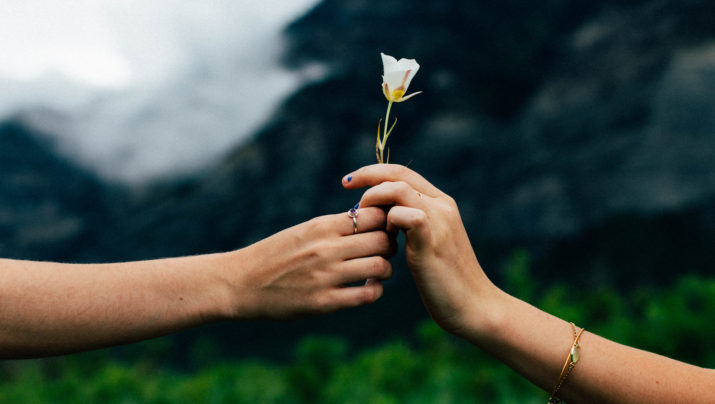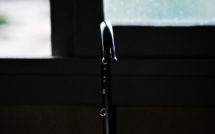
There’s a line a fellow doula always says, that being an abortion doula is providing unconditional love to a stranger for fifteen minutes at a time. I have yet to come across a more succinct way of describing what we do.
Officially, our job as doula volunteers is to provide nonjudgmental emotional and physical support before, during, and after an abortion procedure. In the specific clinic I’m at, the doulas wear scrubs and can be mistaken for the amazing doctors and nurses and medical assistants we are working alongside. The staff people at the clinic are incredibly kind and passionate, and I have been humbled at how many times patients leave saying that they were so scared to arrive, but that their care far surpassed any medical experience they had gone through in the past. But it’s important to distinguish that we as doulas don’t do anything medical—we are there solely to talk, hold a hand, wipe a tear, or provide (or at least attempt to, in my case) comic relief.
By the time the patient reaches me, they have already met with a social worker and a charge nurse. I do not provide medical care and I do not have the scope (nor the licensure) of a social worker. I do, however, wait with the patient after I’ve guided them into the room and handed them their gown and slippers to change into. We talk about feelings surrounding abortion and I answer questions they might have. The most common question is Will it hurt? to which there is no easy answer, as everyone feels things differently.
Sometimes they ask me if I’ve had an abortion myself. It can be awkward to have to dodge that question, but the answer I always fall back on is that one in three women* will have an abortion in their lifetime—they are not alone, and what they are about to do is safe, legal, and the right choice for them (because they know their life and reality better than anyone else).
Sometimes, it’s a lighter dialogue. They ask if I dye my hair or about something I’m wearing. A lot of times we talk about pop culture or the news or what we’re planning on eating later. As the medical staff enter the room, set up, and begin the procedure, I try to provide whatever emotional support is needed in the moment. Sometimes that means small talk to distract them, and sometimes that means holding their hand and wiping away tears. Sometimes that means guided breathing or explaining what’s going on around them, describing unfamiliar noises or sensations. Sometimes my direct presence isn’t needed at all, and I just offer to bear witness quietly in the background. Whatever the experience, I am there to be a nonjudgmental companion and support person. After it’s complete, I wait with them in the recovery room and hold the space for them to process the experience, if needed. Each encounter is unique.
It would be negligent to gloss over the complicated emotions that surround abortion, but it is also problematic to paint abortion into a singular narrative. The reality is that there is no one-size-fits-all story. But regardless of how confident someone feels about their choice to have an abortion, it’s nearly impossible to completely avoid the anti-choice (“pro-life”) rhetoric that exists. Part of being an abortion doula is simply saying: Your choice is valid and okay. Hell, better than okay, because it’s your life, and your choice.
I’ve realized abortion is a topic that makes some people very uncomfortable. Some people like to have the sob story, the 15-year-old pregnant girl who didn’t know any better and was kicked out onto the streets when her family discovered her pregnancy. That’s a narrative that exists from real situations, yes, but there are so many other truths as well. In reality, abortion can be messy, just as life is messy. But it can also be a time of peace and healing for a pregnant person electing to have one.
There are women who are already mothers, who don’t have the means to support another child. There are some who aren’t ready to be parents yet, or never want to be. Plenty of people come in who use birth control perfectly, yet it still fails. Some people have been raped. Some really, really want to carry the pregnancy to term, yet other circumstances in their life don’t allow it. I’ve talked to pregnant people who are having an abortion when everything in their religion and culture frown upon it, yet they can’t carry the pregnancy for whatever reason. There’s not just one justified abortion story—each situation, each experience, is just as valid as the next.
I write all of this with a general discomfort I carry when people I barely know affirm my work, as if to imply that what I’m doing is hard or noble and in turn, I deserve a gold star in social justice work. That being said, I realize the word doula isn’t in everyone’s daily vocabulary, and in order to effect positive change, demystifying the work doulas do, and on a broader level, destigmatizing abortion is of utmost importance. What people don’t realize is that the unconditional love we provide for those fifteen minutes is reciprocal. When patients thank me upon leaving the clinic, I return the sentiment—to be allowed into those vulnerable moments is a healing and growing opportunity for me as well. It teaches me about visceral human experience in all its messiness and complexity, fifteen minutes at a time.
*A note on language: “Not everyone who can get pregnant or has an abortion identifies as or calls themself a woman or uses ‘she/her.’ We use ‘person who is pregnant’ and ‘they/them’ to include everyone and be respectful of the language they prefer. In cases where we are citing a statistic where the source used ‘women,’ we have tried to balance our desire to be inclusive with our need to cite our sources properly by saying, for example, ‘3 in 10 people who the Guttmacher Institute identified as women.’ We have cited our sources this way to reflect the diversity of gender expression and to acknowledge that institutions, especially medical institutions, often coercively designate or make assumptions about our bodies.” (Borrowed from the Doula Project zine, available at http://www.diydoula.org/)
Svea is a volunteer with The Doula Project.
Photo by Evan Kirby.




